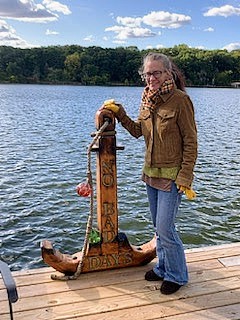Letter: Bill supports biomarker testing
This letter originally ran in the Lincoln Journal Star.
For over 20 years, Ali spent much of her time caring for others as a nurse and a single mother of two. When Ali started feeling ill in 2021, she knew her symptoms were indicative of a larger issue. 
Ali voiced her concerns to her doctor but was dismissed. What followed was a years-long struggle through misdiagnoses, testing errors, and an uphill battle to receive the quality, affordable care she needed. After three years of struggling, Ali was finally diagnosed with terminal cancer. The enhanced premium tax credits have helped keep her health insurance costs more affordable, but now this is at risk.
In the fall of 2021, Ali went to the hospital for what she thought was a cardiac episode only to learn it was a seizure. She was prescribed anti-seizure and cardiac medication, yet her symptoms persisted.
At the time of her symptom onset, Ali had health insurance through her employer. Due to the seizures, she had to stop driving and working, which caused her to lose her health insurance. Shortly afterward, she had a stroke.
Ali continued to seek answers from different doctors, but they overlooked her concerns, attributing them to other health issues including lupus and a mild heart attack—which didn’t explain her frequent viral infections and bruising. Frustrated, Ali asked for a bone marrow biopsy.
Although Ali interpreted the preliminary biopsy results as leukemia, her doctor was dismissive. Undeterred, Ali sought more referrals. After months of additional testing, including a second bone marrow biopsy, she was diagnosed with T-cell large granular lymphocytic leukemia (T-LGL). Despite losing her ability to walk, Ali was told this type of leukemia wasn’t bad enough to treat yet.
Without health insurance, Ali paid for her health care out of pocket. She sold her car and relied on her last two paychecks, loans, and the generosity of her family, friends, and church to stay afloat. She lost her house and had to move in with her brother and sister-in-law. “I have been begging, borrowing, and pleading just to make ends meet,” she says.
Eventually, Ali was approved for Medicaid, but by then she had already endured so much. “I had to give up everything I worked so hard for. My career, everything.”
Ali's pain became unbearable. She told her doctor she couldn’t live this way, so he ordered an MRI which showed the leukemia had invaded her bones and lymph nodes—transforming into an aggressive form of lymphoma. Ali’s prognosis shifted from years to just months to live.
To continue her critical cancer care, Ali signed up for health insurance through the Marketplace. Because of the enhanced premium tax credits that help lower the cost of Marketplace plans for individuals with low- or limited-incomes, Ali's plan was $32/month. Despite this low cost, Ali still struggled to afford necessities like groceries.
“I either have to pay my premium, or I go without food,” Ali says. “I’m dying. And now I can’t afford food because the only thing I can afford to pay for is my insurance.”
The enhanced premium tax credits are currently set to expire at the end of 2025. If this happens, Ali will be forced to pay between $600-$700 for the most basic Marketplace health plan.
“If they get rid of [the enhanced tax credits] relief, how am I going to survive?” she asks. “I’m not going to be able to eat. I could be homeless because I can’t afford to live anywhere."
Ali currently lives alone. A Certified Nursing Assistant (CNA) visits her twice a week to help with bathing and personal hygiene, household chores, and going to the store. Now 47-years-old, Ali is starting to become bed-bound and plans to increase the CNA visits to three to four times per week. Once she is closer to the end of her life, she’ll receive 24/7 care.
Ali’s family has been an important support system during her cancer care, and she’s grateful to spend time with her 4-year-old and 4-month-old granddaughters. “They are everything to me...I’m doing this [cancer care] without being able to leave anything to my family.”
Having affordable and comprehensive health insurance is key for surviving cancer. Cost should never be a barrier for cancer patients and survivors to access lifesaving cancer screening, early detection, treatment, or follow-up care.
“I shouldn't have had to fight even harder after my cancer diagnosis,” says Ali. “I'm already living on peanut butter and soup in order to die with dignity.”
Cancer patients like Ali deserve quality, affordable health coverage. Unless Congress acts, 7.2 million people in America could face higher health insurance costs.